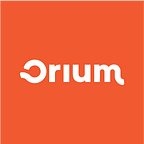Learning from Leaders
An ongoing series highlighting insights and knowledge from Orium’s Leadership Team.
Before joining Orium, Kunal worked in public accounting, leading internal audits globally and overseeing the accounting and financial functions of a publicly-listed automotive parts manufacturing facility.
Since joining Orium, he has applied those experiences in a much more dynamic and high-growth environment. In just three years, he has built the finance team and led the org through the complexities of a round of funding that resulted in Orium securing a $14 million investment from Tercera last summer.
He recently shared some of his lessons learned with Orium’s Craft Development team.
Typically, when people think of finance, they think of a boring role where people toil away behind Excel day after day. While that’s undoubtedly part of the role, let me clarify that being the finance leader at a high-growth firm during a funding round is decidedly not boring.
I joined Orium in part because I saw an opportunity to lead a department, expand the scope of my duties, and take on challenges I’d rarely (if ever) get to tackle in a traditional setting. Going through a fund raise may not quite be a once in a career experience, but it doesn’t come up often, and it provides a great backdrop for the three most important lessons I’ve learned in the past three years.
1. Choose the Right Partners
Let’s go back to March 2022 when Lindsey Colquhoun (VP Culture), Jason Cottrell (CEO), Thomas Mulreid (Head of Sales), and I found ourselves in Chicago, ready to pitch to Tercera.
After anxiously making last-minute updates to the presentation the night before, we were as ready as we would be. We “suited up” the following morning and expected a formal meeting, but the atmosphere quickly became relaxed, with Bill and Michelle (both from Tercera) easing our nerves with their warm smiles. They asked questions about the business model, market size, and opportunities with our key partners, turning our 2.5 hours into an active discussion. We left the meeting room with a sense of relief but decided that it was too early for a round of high fives. Thankfully we didn’t have to wait too long before hearing that we had received their first stamp of approval!
While this was one of the first encounters with Tercera, it set the tone for what was to come. Bill and Michelle remained authentic, empathetic, and logical throughout the fundraising process. Of course, we aligned over the long-term vision and terms of the deal, but most importantly, we trusted each other and knew we could work together in the long run.
Whether you’re looking to enter a significant financial partnership, building a team to create an effective marketing campaign, or collaborating on a complex project, finding the people with whom you can build trust is crucial.
2. Be Honest About What you Don’t Know
As the crew can attest, hours went into planning and preparing for the initial meetings with Tercera, but the work didn’t end there. When the exhilaration faded, and the dust settled, the heavy information requests started to pour in. The due diligence process covered the following:
- Sales, Marketing, and Revenue
- Financial Reporting, Forecasts, and Taxes
- People, Culture, and Headcount
- Legal, Corporate Governance, and Intellectual Property
Knowing the data and having accurate financials are expected, but with so much information needed, there were inevitably times I simply didn’t have the answers. It can be daunting to tell the people who are ready to back your business with money that you don’t know something. Having the courage to say, “I don’t have the answer to that, and I will get back to you” goes a long way to building credibility.
It’s okay not to know everything as long as you’re a) showing that you’re capable of doing what needs to be done, and b) following up with the answers once you get them.
Come prepared, but be honest about when you don’t have the answers. Just be careful not to overuse it and follow up promptly.
3. Never Lose Sight of Your Goal
Whenever large dollar sums change hands, the negotiation and legal process can be long — especially if you have a complicated organizational structure. With the inertia at the beginning of a deal, it can be tempting to rush and glaze over details near the end. Take the time to check-in with your counsel, accountants, and tax professionals on the finer points to avoid having to make amendments down the road.
Celebrate the small milestones as you progress, but keep track of your funding target deadlines and manage the “to-do” list accordingly. As the deadline approaches, align on which items must be completed pre-close and which can be added to the post-close agenda for the first 100 days.
While we went in to secure funds, we got so much more than we had hoped for. We got a fantastic partner and board with years of experience and a Rolodex of advisors and resources.
When you keep the end goal in mind, you can prioritize and focus on what really matters. Not only will you be better able to achieve what you set out to accomplish, but you’ll also find you get a halo of benefits that surround it. But you can’t get any of it if you aren’t able to get the most important pieces in place.
Even with the occasional long day and stressful deadline, my three years at Orium have flown by! I wanted a challenge, an opportunity to flex my skills and take both my career and the org to the next level. It hasn’t been easy, but it has definitely been worth it.
Stay tuned for more updates in our “Learning from Leaders” series and visit orium.com or our LinkedIn page to learn more about our team.
